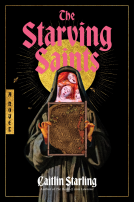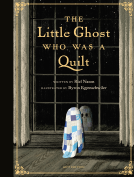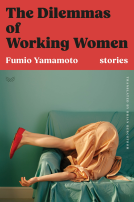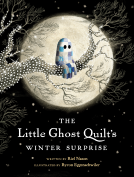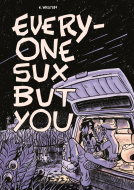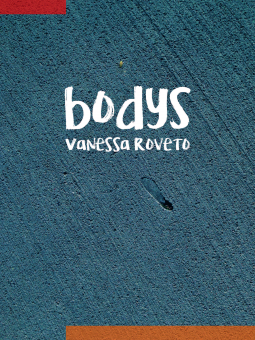
bodys
by Vanessa Roveto
This title was previously available on NetGalley and is now archived.
Send NetGalley books directly to your Kindle or Kindle app
1
To read on a Kindle or Kindle app, please add kindle@netgalley.com as an approved email address to receive files in your Amazon account. Click here for step-by-step instructions.
2
Also find your Kindle email address within your Amazon account, and enter it here.
Pub Date Nov 01 2016 | Archive Date Oct 31 2016
University of Iowa Press | Kuhl House Poets
Description
Roveto's sentences hurtle forward with withering disjunctive energy, laying down traps of wordplay, tacking toward and veering away from syntactical targets, trying-on and sloughing-off pronoun positions with abandon. Yet for all its postmodern bravado—and irreverence, and frequent scary hilarity—bodys remains abidingly attached to exploring the problem of a human speaker addressing itself to another, and colliding with its own otherness along the way. It is the same problem—articulation as disarticulation—that animates the great Renaissance sonnet sequences, from which bodys is affectionately, and perversely, descended. What is bodys—what are bodys—anyway? A dysfunction in the body's ability to multiply itself? A dysmorphic take on the body's sense of its reality? A dystopian vision of a world in which boundaries between selves and others have been overwhelmed by commerce, surveillance, medical technology, nihilistic agitprop? “Last night one of the girls asked about the relationship between a body and nobody,” Roveto writes. “It was the beautiful question.”
Advance Praise
“bodys is disturbed. Somewhere in its passage from cozy, imaginary singularity—
a self-sufficient body, a body politic, a somebody—to the reality of its plural self, Roveto’s body of work lands in an in-between, stateless state in language, free and delirious, bound and undisciplined. bodys is a staggeringly audacious wake-up call to the numb soul. Not quite poetry or prose, cultural theory or pseudo-psychoanalytic case study or memoir, not merely a savagely funny satire of ‘I’m scared culture’ or an erotically desolate musing on the possibility of love or rapture, bodys is a dystopian, dyscombobulating, sonorously discordant anatomy of shared disaster. Its sensibility is ancient and futuristic. There isn’t a boring or innocent sentence in the book. It is work of originating genius that puts the verse back in subversive, and bites the reader in the ass like no book I know.”—Mark Levine
“Inhabiting a nightmarish world of anonymous characters with unstable identities behaving like ids freed of their superegos, Vanessa Roveto’s poems can barely be contained in the boxes she packs them into. Their potency oozes out in brilliantly dark observations, tart puns, a witty archness that burrows subversively into the deeply sticky matters of sex, family, gender, violence. But the apparatus of self-protection she builds against the overwhelming exigencies of ‘bodys’ and their disembodied parts constantly threatens to expose a vulnerable core, and it is this tension that makes Roveto’s poems thrilling reading.”—Donna Stonecipher
Available Editions
| EDITION | Paperback |
| ISBN | 9781609384555 |
| PRICE | $19.95 (USD) |
Links
Featured Reviews
 Joseph S, Reviewer
Joseph S, Reviewer
bodys by Vanessa Roveto is the poet's first collection of poetry. Roveto does not have much of a public biography. I did find this, "Vanessa Roveto is a writer living in the United States" which is further updated by the University of Iowa Press as "Vanessa Roveto is a writer living in the San Fernando Valley. "
It is weird, sometimes, the way we like things. Why do you like blue or spaghetti? You just do and it does little good to explain it even if you could. bodys is something like that. I enjoyed it and was captivated by it, but the reasoning is difficult to explain. Starting with the title, it is neither (the proper) plural nor possessive, however, in practice, it could be both.
The opening poem drops the reader into an uncomfortable feeling situation. The reader is a voyeur who seems to have wandered into the wrong room at an adult party. Maybe it's a shock at the start to get the reader's attention but it continues through the collection. However, it is written in a manner that even if it's not your type of thing you can't look away or put down the book.
The writing style seems to be a mix of Whitman and William S Burroughs. There is a rhythm and flow the reader can get lost in while reading. This is balanced against a seemingly cut up style of word usage.
The time-sensitive woman moved without sentiment because after all a smile is nothing but a place that helicopters watch.
There are both overt and covert references to sex and sexual organs throughout the collection.
They met in the library stacks. The combination of graduate student and prostitute could not be underestimated.
A below-job is relevant in that it occurred, if for no other reason
The school for art, brushing upon its rich history of auto-vaginal insertion.
Poetry that is at least MA-17 but somehow does not seem offensive or something that might embarrass the reader while reading on a train commute to work. Well done in its own unique style and worthy of several reads.
